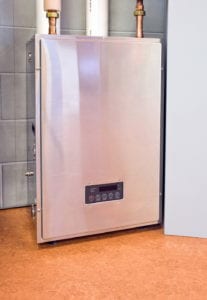Types of Water Heating Systems to Consider Installing

Let’s be honest, most people don’t really think or care much about what kind of water heater they have in their homes as long as it provides hot water for them when they need it. That’s the thing, though: not every water heater is going to work the same way in every situation. The kind of water heater you install in your home actually has quite a large impact, which is why you should consider the various options and the benefits each can provide. There are different types of water heaters which range from natural gas water heaters, electric water heaters, solar water heaters, heat pump water heaters, tankless water heaters to storage tank water heaters, conventional water heaters, condensing water heaters and demand water heaters. Many are high efficiency, which can save money on propane or electric rates, and offer cost savings on energy bills by having a lower energy consumption.
How these different hot water heaters buildup water temperature varies, but among the most common types are gas water heaters, which use natural gas or propane for their fuel source.
Types of Water Heaters
Tank
Tank water heaters are the most common water heater type available on the market. They consist of a large storage tank which can hold up to 100+ gallons of water depending on the model. These kinds of water heaters stay operating in some capacity day and night, ensuring that they always have a standing supply of hot water available in case you need it.
While tank water heaters are certainly the most convenient in terms of how much hot water they can provide at any given time, they do have some drawbacks. The first drawback is, upfront, that it physically takes more space to install a tank water heater than to install a tankless water heater. This isn’t a problem in many homes, but in some the lack of available space for a massive tank precludes installing one of these systems and leads to needing other water heater options. The second problem is that staying on at all times wastes energy and has heat loss, which adds to the operating cost of the system. For some, these things are worth having hot water available at a moment’s notice at all times. For others, it’s worth considering other options.
The other thing to consider with these is that sediment can buildup in the bottom of the tank, can cause corrosion and without proper maintenance the lifespan of these units can be reduced greatly, offsetting the lower initial cost. Some hybrid water heaters may use a tank of some kind, depending on their setup.
Solar water heating relies on a tank to hold the hot water, and some will use pumps to get it into the home, while others rely on gravity as the conventional storage tank is on the roof and when hot water is needed it simply flows downward into the home. The energy savings from these type of heater system is great, since the sun is heating the tank, but it is not practical in areas that are not extremely hot. Other solar water heaters use solar panels to provide solar energy for heating.
Tankless
Tankless water heaters don’t use storage tanks, only activate when they are needed, and heat water on its way to the faucet. This obviously alleviates the disadvantages of using a tank water heater, which is why people tend to install them, such as having limited space heating water can be tricky. You can save a lot of money in energy costs and water use over the course of a year by using a tankless water heater. However, you should know that tankless systems are not perfect for every scenario, either. There is a slight delay between when you turn on a faucet and when hot water arrives. Tankless water heaters are also more easily overwhelmed than tank water heaters with high demand for heated water, which makes them less than ideal for households where multiple people need to use hot water at once, which can also reduce flow rate.
These use electricity normally for their energy source, and the heat exchanger the water flows through is heated on it’s way out of the hot water system. If there is a clog it can cause a backup.
Heat Pump
Heat pump water heaters occupy a nice middle space between tank and tankless water heaters in terms of output and high-efficiency / energy efficiency. A heat pump water heater is a tank water heater that includes a heat pump coil. During operation, the system will absorb thermal energy from the area around the water heater and use it to help heat the water in the tank. This is a great option if you have the space for it. They can be energy efficient in heating cold water to your desired temperature. Heat pump systems offer homeowners another great option for using less energy, having little to no exhaust gases and still having a compact size closed-loop system for water heating.
The professional plumbers at Climate Control Heating & Cooling offers comprehensive water heater installation services throughout Kansas City, MO. If you need help selecting a new water heater, contact us today for an appointment.

